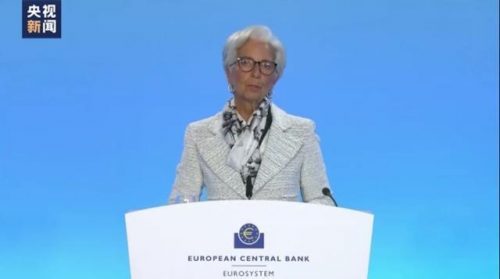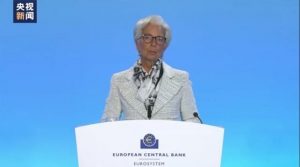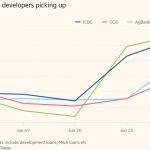ECB raises rates by 75 basis points and promises more to come
欧洲央行加息75基点至0.75%
欧洲央行(ECB)将利率提高75个基点以应对创纪录通胀,尽管人们担心欧元区已经因为能源价格飙升而正在滑向经济衰退。
此举将欧洲央行的基准存款利率从零提高至0.75%,达到自2011年以来的最高水平。就加息幅度而言,此举平了欧洲央行借款成本上调幅度的最高纪录。
欧洲央行行长克里斯蒂娜•拉加德(Christine Lagarde)表示,尽管如此幅度的加息并非“常态”,但在今日加息之后,未来几个月将进一步加息,以遏制目前高达9.1%的通胀率。
The European Central Bank has raised interest rates 75 basis points to tackle record inflation, despite fears soaring energy prices will push the eurozone into recession.
The decision, which was unanimously backed by all 25 members of the governing council and matches the ECB’s previous biggest increase in borrowing costs, lifts the bank’s benchmark deposit rate from zero to 0.75 per cent — the highest level since 2011.
Christine Lagarde, the ECB’s president, said investors should not assume moves on this scale were “the norm”, but there would be “several” rate rises in the coming months to bring inflation down from its latest “far too high” record of 9.1 per cent back towards the bank’s target of 2 per cent.
There were “probably more than two” increases to come including the latest one, “but also probably less than five”, she told the media following the decision.
The euro lost 0.4 per cent against the dollar in the late afternoon to trade at $0.996. Europe’s regional Stoxx 600 share gauge closed the session 0.5 per cent higher, retracing declines earlier in the session.
The latest rate rise comes in spite of mounting fears that the currency area’s economy will shrink in the coming months as surging energy prices — largely the result of Russia’s throttling of critical European gas supplies — hit businesses and households throughout the region.
The ECB raised rates by 50bp in July, its first such move for more than a decade. But its last 75bp increase was a three-week technical adjustment to smooth the euro’s launch in 1999.
German bonds sold off, with the yield on two-year debt, which is sensitive to changes in interest rate expectations, rising 0.28 percentage points to 1.37 per cent — its highest level in 11 years.
The 10-year Bund yield, seen as a proxy for borrowing costs across the eurozone, rose 0.17 percentage points to 1.74 per cent. Italian bond prices also fell, with the 10-year yield climbing 0.22 percentage points to 4.09 per cent, according to Tradeweb data.
The ECB has lagged behind most major central banks in its response to high inflation. The US Federal Reserve is widely expected to announce a third consecutive 75bp rise at its meeting this month, which would lift the federal funds rate to a target range of 3 per cent to 3.25 per cent.
In response to the ECB move, Denmark’s central bank also raised its benchmark rate 75bp to 0.65 per cent, in line with its mandate to keep the Danish crown stable against the euro. The move ended nearly a decade of negative policy rates in the country.

So far eurozone economic data have remained surprisingly resilient. Growth rose by an unexpectedly strong 0.8 per cent in the second quarter and the unemployment rate hit a record low of 6.6 per cent in July, bolstering calls by hawkish ECB policymakers for more “forceful” action on rates.
The Frankfurt-based bank lifted its growth forecast for this year to 3.1 per cent, but it slashed its prediction for next year to 0.9 per cent and trimmed the one for 2024 to 1.9 per cent.
However, unlike many economists, the bank does not expect a recession — two consecutive quarters of falling output — instead predicting the economy would “stagnate later in the year and in the first quarter of 2023” in its baseline scenario.
A bleaker forecast, devised by the central bank and which assumes a drastic worsening of Europe’s energy crisis, does foresee the eurozone economy shrinking 0.9 per cent next year. Lagarde said some risks in the downside scenario had already materialised, such as Russia halting gas flows via the Nord Stream 1 pipeline that runs under the Baltic Sea to Germany.
The central bank raised its inflation forecasts sharply to 8.1 per cent for this year, to 5.5 per cent for next year and to 2.3 per cent for 2024. Carsten Brzeski, head of macro research at ING Bank, said: “It is still hard to see how the ECB can bring down inflation that is mainly driven by supply side factors.”
The ECB said its main refinancing rate for bank liquidity would increase from 0.5 per cent to 1.25 per cent. The rate on its marginal lending facility for overnight loans to banks would rise from 0.75 per cent to 1.5 per cent.
The bank also took measures to ease shortages of high-quality and liquid collateral, removing a zero per cent cap on interest for government deposits, which analysts said would avoid much of the €600bn covered by the change shifting into short-term government debt.








